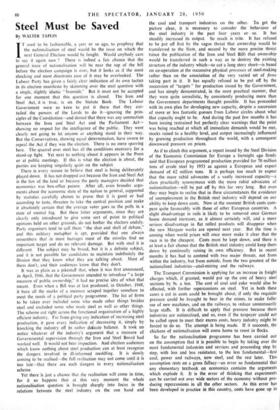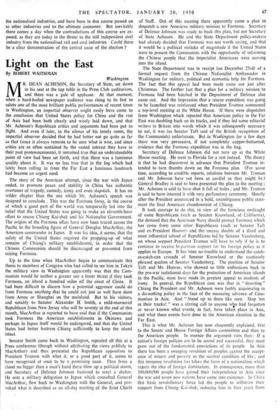Steel Must be Saved
By WALTER TAPLIN
IT used to be fashionable, a year or so ago, to prophesy that the nationalisation of steel would be the issue on which the next General Election would be fought. Would anybody care to say it again now ? There is indeed a fair chance that the general issue of nationalisation will be near the top of the bill before the election campaign is over, but it looks as if the most shocking and most disastrous case of it may be overlooked. The Labour Party has given a fairly clear indication of its own tactics in its election manifesto by skimming over the steel question with a single, slightly idiotic " bromide." But it must not be accepted for one moment that this question is closed. The Iron and Steel Act, it is true, is on the Statute Book. The Labour Government were so keen to put it there that they cur- tailed the powers of the Lords to do it—ignoring the prin- ciples of the Constitution—and denied that there was any connection between the Iron and Steel Act and the Parliament Act— showing no respect for the intelligence of the public. They were clearly not going to let anyone or anything stand in their way. But the Conservatives, showing equal determination, have sworn to repeal the Act if they win the election. There is no mere sparring here. The quarrel over steel has all the conditions necessary for .a stand-up fight. Yet next to nothing about it appears in the Press or at public meetings. If this is what the election is about, the parties are keeping singularly quiet on the subject.
There is every reason to believe that steel is being deliberately played down. It has not dropped out because the Iron and Steel Act is the law of the land or because the party managers decided that economics was box-office poison. After all, even broader argu- ments about the economic state of the nation in general, supported by statistics carefully chosen to prove that it is good or bad according to taste, threaten to take the central position and make it absolutely certain that the average voter goes to the polls in a state of mental fog. But these latter arguments, since they are clearly only introduced to give some sort of point to political opinions held on other grounds, do not bother the electors unduly. Party organisers tend to call them " the shot and shell of debate," and this military metaphor is apt, provided that one always remembers that in most barrages most of the missiles find no important target and do no relevant damage. But with steel it is different. The subject may be broad, but it is a definite subject, and it is not possible for candidates to maintain indefinitely the illusion that they know what they are talking about. Most of them don't, and their audiences know that they don't.
It was as plain as a pikestaff that, when it was first announced, in April, 1946, that the Government intended to introduce " a large measure of public ownership," it had no precise idea of what that meant. Even when a Bill was at last produced, in October, 1948, it bore all the marks of a measure scraped together somehow to meet the needs of a political party programme. The list of firms to be taken over included some who made other things besides steel and excluded some who made steel as well as other things. The scheme cut right across the functional organisation of a highly efficient industry. Far from giving any indication of increasing steel production, it gave every indication of decreasing it, simply by knocking the industry off its rather delicate balance. It took no notice whatever of the industry's argument that a measure of Governmental supervision through the Iron and Steel Board had worked well. It would not bear inspection. And election audiences which know nothing about steel production can at least recognise the dangers involved in ill-informed meddling. It is slowly coming to be realised—the full realisation may not come until it is too late—that there are such dangers in every nationalisation scheme.
Yet there is just a chance that the realisation will come in time, for it so happens that at this very moment the whole nationalisation question is brought sharply into focus in the relations between the steel industry on the one hand and
the coal and transport industries on the other. To get the picture clear, it is necessary to consider the behaviour of the steel industry in the past four years or- so. It has steadily increased its output. So much is trite. It has refused to be put off first by the vague threat that ownership would be transferred to the State, and second by the more precise threat (since the publication of the Iron and Steel Bill) that ownership would be transferred in such a way as to destroy the existing structure of the industry which—to cut a long story short—is based on co-operation at the successive physical processes of steel-making rather than on the association of the very varied set of firms taking part in it. It has equally refused to be put off by the succession of "targets " for production issued by the Government, and has simply demonstrated, in the most practical manner, that they were quite unrealistic, by consistently producing more than the Government departments thought possible. It has proceeded with its own plan for developing new capacity, despite a succession of more or less fantastic guesses from Labour circles about what that capacity ought to be. And during the past few months it has been issuing restrained but perfectly clear warnings that the point was being reached at which all immediate demands would be met, stocks raised to a healthy level, and output increasingly influenced by growing production throughout the world, with a consequent downward pressure on prices.
As if to clinch this argument, a report issued by the Steel Division of the Economic Commission for Europe a fortnight ago firmly said that European programmed production provided for 70 million tons of crude steel by 1953 as against a European and export demand of 62 million tons. It is perhaps too much to expect that the more rabid advocates of a vastly increased capacity—a class practically synonymous with the more rabid advocates of nationalisation—will be put off by this for very long. But even they may begin to realise that in these circumstances the avoidance of unemployment in the British steel industry will depend on our ability to keep down costs. Now at the moment British costs com- pare quite favourably with those of other European countries. A slight disadvantage in rails is likely to be removed once German home demand increases, as it almost certainly will, and a more serious disadvantage in flat rolled products will disappear when the new Margam works are opened next year. But the time is coming when world prices will once more make it clear that the race is to the cheapest. Costs must be kept down, and there is at least a fair chance that the British steel industry could keep them down by continually raising its own efficiency. But in recent months it has had to contend with two major threats, not from within the industry, but from outside, from the two greatest of the nationalised industries—cbal-mining and the railways.
The Transport Commission is applying for an increase in freight charges which, if granted, would put up the cost of heavy steel sections by 9s. a ton. The cost of coal and coke would also be affected, with further repercussions on steel. Yet in both these cases a cut in costs could be brought about, if only the requisite pressure could be brought to bear in the mines, to make fuller use of new machines, and on the railways, to reduce unnecessarily large staffs. It is difficult to apply that pressure because these industries are nationalised, and so, even if the taxpayer could not be called upon to meet their excess costs, heavy industry might be forced to do so. The attempt is being made. If it succeeds, the chickens of nationalisation will come home to roost in flocks.
So far the nationalisation programme has been carried out on the assumption that it is possible to begin by taking over the most fundamental industries and services and proceeding step by step, with less and less resistance, to the less fundamental—first coal, power and railways, now steel, and the rest later. This assumption rests on a gross fallacy—an error so fundamental that any elementary textbook on economics contains the arguments which explode it. It is the error of thinking that experiments can be carried out over wide sectors of the economy without pro- ducing repercussions in all the other sectors. As this error has been developed in practice in this country, costs have gone up in
the nationalised industries, and have been in due course passed on to other industries and to the ultimate consumer. But inevitably there comes a day when the contradictions of this course are ex- posed, as they are today in the threat to the still independent steel industry from the nationalised rail and coal industries. Could there be a clear demonstration of the central issue of the election ?



































 Previous page
Previous page